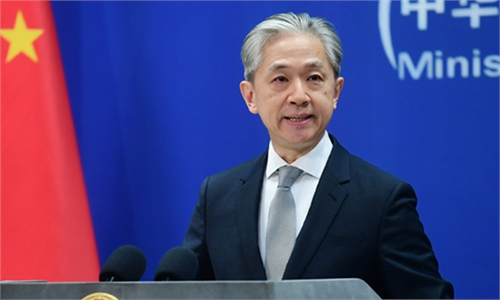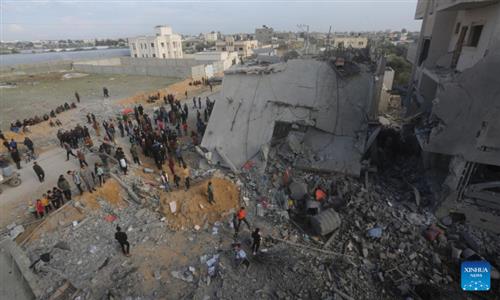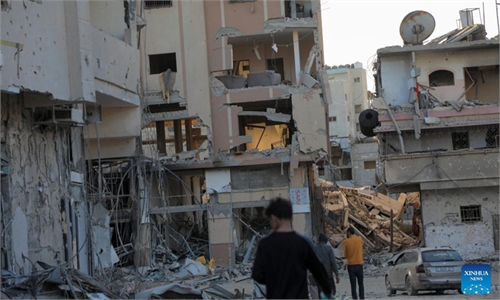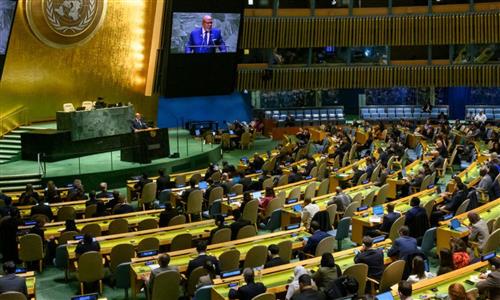Implementation urged as intl community welcomes UNSC resolution for Gaza cease-fire
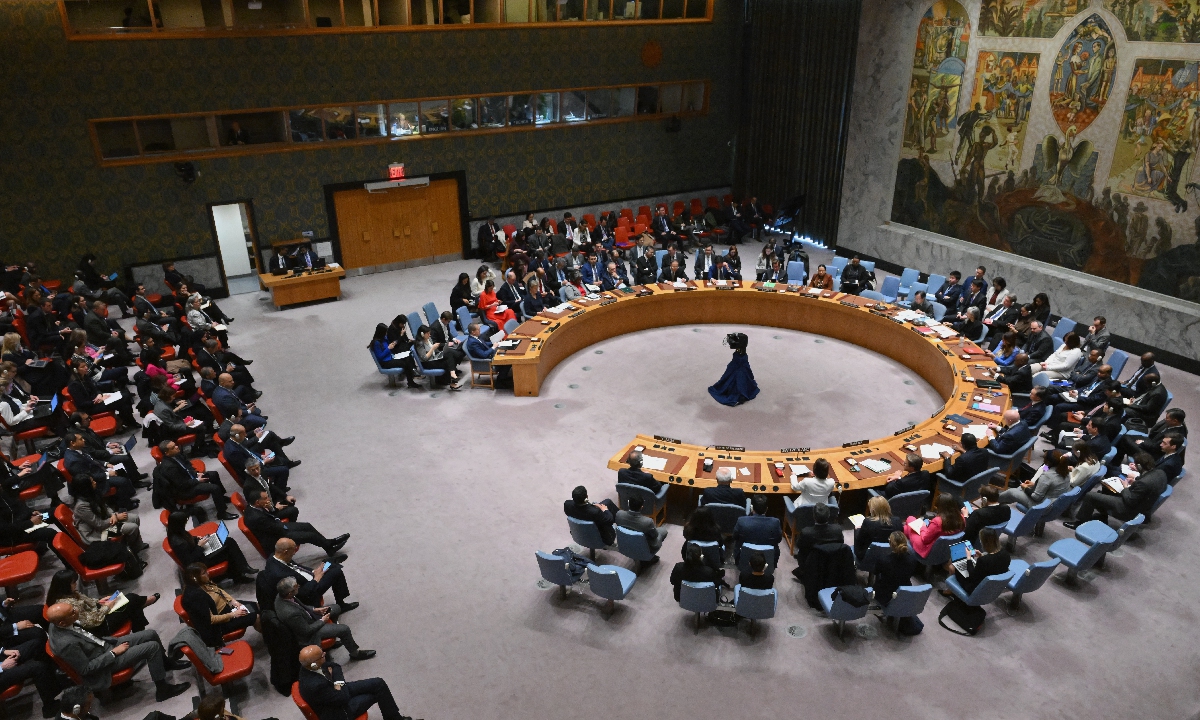
The UN Security Council meets on the situation in the Middle East, including the Palestinian question, at the UN headquarters in New York on March 25, 2024. After more than five months of war, the UN Security Council for the first time passed a resolution calling for an immediate cease-fire in Gaza. The US, Israel's ally which vetoed previous drafts, abstained. Photo: AFP
The UN Security Council (UNSC) on Monday local time approved a resolution demanding an immediate cease-fire in the Gaza Strip for the Muslim holy month of Ramadan, after the US abstained from the vote, leaving Israel to face further presure from the international community.
The historic passing marks the first time that the UNSC has successfully voted to demand an immediate cease-fire in Gaza since the start of the new round of Israeli-Palestinian conflict in October 2023. Several previous attempts have failed due to US' repeated block.
Analysts said the newly adopted resolution shows the common aspiration of the international community for a cease-fire, and also creates conditions for humanitarian aid and further mediation.
However, the implementation of the resolution may still face setbacks regarding Israel's reactions. But if Israel chooses to deviate from the common expectations on the global stage, then it will face deeper diplomatic isolation, which may eventually lead to its domestic political instability.
The US' decision to abstain, which was made under both domestic and international pressures, does not represent a fundamental change in the Washington's policy toward Israel and its position on the Israeli-Palestinian conflict.

The second vessel and a platform, left, with food aid from aid group World Central Kitchen are seen on dock waiting to depart for Gaza, at Larnaca port, Cyprus, Tuesday, March 26, 2024. Photo: VCG
Common aspirationAccording to the UN, the resolution was tabled by 10 non-permanent members of the UNSC, and the remaining 14 council members voted in favor of the resolution.
The resolution demanded "an immediate cease-fire for the month of Ramadan leading to a lasting sustainable cease-fire." It also demands the release of all hostages seized in the Hamas-led attack.
There was a round of applause in the council chamber after the vote on Monday, according to an Aljazeera report.
Zhang Jun, Ambassador and Permanent Representative of China to the UN, said on Monday that "all harm to civilians must cease immediately" and the offensive must end.
European Commission President Ursula von der Leyen said the EU welcomed the passing of the resolution, noting that implementation of the resolution is vital for the protection of all civilians.
Li Haidong, a professor at the China Foreign Affairs University, told the Global Times on Tuesday that the resolution reflects the common aspiration of the international community. "The mainstream international voice is a cease-fire and a two-state solution."
According to Liu Zhongmin, a professor at the Middle East Studies Institute of Shanghai International Studies University, the resolution has restored the previously damaged UN authority, and led to greater and more authoritative international pressure on Israel.
This is a victory of morality and justice for the international community through unremitting efforts, Liu said.
The adoption of the resolution has created conditions for further relief of humanitarian disasters and for further mediation by the international community, Liu said.
However, Israel has shown no signs of backing off. Israel's envoy to the UN Gilad Erdan, claimed that the UN resolution "undermines the efforts to secure" the Israeli hostages' release from Gaza.
Israeli Foreign Minister Israel Katz said on Monday that his country would not abide by the resolution. "The State of Israel will not cease fire. We will destroy Hamas, and will continue to fight until the return of all hostages to home," Katz said on X (previously Twitter).
The US Ambassador to the United Nations Linda Thomas-Greenfield has termed the resolution as "nonbinding," according to a media release from US mission to the UN.
A smooth implementation of the resolution will not be easy, Liu said. In the best-case scenario, the ceasefire holds during the remaining two weeks of Ramadan. But after that, given Israel's behavior and strategic choices, as well as US' two-faced approach, the humanitarian disaster in Gaza is likely to continue, the expert said.
In a post on X, UN Secretary-General Antonio Guterres said the resolution must be implemented, and "failure would be unforgivable."
If Israel ignores the resolution and continues its brutal war in the Gaza Strip and continues to create a humanitarian disaster, then the international community, with the UN as the most authoritative coordinating and empowering body, may come up with follow-up resolutions, which will make Israel isolated in the international community, Li said.
Lin Jian, a spokesperson of Chinese Foreign Ministry, expressed support and welcome toward the UNSC resolution at a press briefing Tuesday. He said it's "in line with the right direction of action and responds to the extensive aspiration of the international community."
Lin said that the UNSC resolutions are binding. "We call on the parties concerned to fulfill their obligations under the UN Charter and take due action according to the requirements of the resolution. We expect countries with important influence to play a positive role on the parties concerned, including taking all necessary and effective means to support the implementation of the resolution."
Growing rifts and divergence
The resolution has also caused rising tensions between Israel and the US. According to Israeli officials, Israel's Prime Minister Benjamin Netanyahu has cancelled a delegation visit to Washington for talks on Israel's planned military operation in Rafah, as Washington "withdraws from its principled position," the new outlet NPR reported.
In response, US National Security spokesperson John Kirby said on Monday that the US was disappointed by the Israeli decision to cancel the trip. He stressed that the US vote "does not represent a shift in our policy."
US State Department spokesperson Matthew Miller called the cancelation "surprising and unfortunate." Some officials even said Israel overreacted, according to CNN.
Despite UNSC resolution, Israel did not stop its killing. Eighteen people have been killed in an overnight Israeli bombing of a house in Rafah, where more than 1.4 million Palestinians are displaced, Aljazeera said on Tuesday. The health ministry in Gaza said Monday that at least 32,333 people have been killed in the territory.
Invading and striking Rafah has been the key divergence between the US and Israel, with Pentagon spokesperson previously warning that invading Rafah would be a mistake.
Even the US, Israel's staunch ally, does not like what Israel is doing, Li said. "The US does not want to sacrifice all its reputation and interests in supporting Israel's brutal attacks."
Experts also pointed to electoral factors behind the fine-tuning of the US approach.
However, there will be no fundamental change in US policy toward Israel, nor in its position on the Israeli-Palestinian conflict, Li said.
The US will still support Israel, but it wants Israel's leaders to be more flexible in pursuing its Gaza policy, rather than the current obstinacy, which is also causing problems for the US, Li said. According to the expert, rifts between the US and Israel have always existed.
The US also wants to put pressure on Israel by not blocking the resolution, said Li. ''If Israel fails to change its policy on the Gaza war, the likelihood of domestic political chaos in Israel under the pressure of such a resolution will increase."

